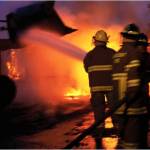06 Apr What if you had a fire – and nobody came?

Volunteer fire departments in Maine and New Hampshire need your help. For the sake of taxpayers’ wallets and residents’ safety, the volunteer firefighter is essential and they perpetuate a great tradition of teamwork and community service that dates back more than a century in many towns. So, what are the challenges and how can you help?
Though some towns may employ a full time professional as chief, the primary challenge is to recruit and retain able-bodied volunteers and then nurture a culture of service, knowledge and training. In our region, that task is becoming harder with an aging population. As one chief in Kennebec County recently lamented, ten years ago he had 15 volunteers under age 50; today he has only four. In addition, an aging population also requires more emergency services – it’s a vicious cycle. That’s what makes getting involved so important.
When committing to be a volunteer emergency responder, individuals are not simply pledging to be on call when it’s their turn, they also must learn the science and technique of fighting fires safely and effectively. Because of the physical challenges and dangers, this is the ultimate team activity in which the right people need to be on deck and ready to go.
Many departments also have combined training for fire and emergency medical services (EMS). In the Town of Falmouth, Maine there are approximately three full time staff, ninety-five call fighters and emergency medical technicians as well as fifteen part-time firefighter/paramedics. In a community of 11,000, the fire/EMS team responds to about 1,800 calls per year half of which are medically related.
With the majority of emergency calls being for medical issues, having a full time staff waiting at the firehouse doesn’t make financial sense for many small towns. Even the region’s larger cities are paring back on full time staff due to the cost of personnel. More and more, towns are relying on mutual aid agreements to ensure coverage.
So what would the cost of full time firefighters be if we can’t replenish the volunteer ranks? The median wage in Portland, Maine for a full time firefighter is listed as $44,611 according to salary.com. In northern and eastern Maine, the median wage is about $5,000 less. In Manchester, New Hampshire, the median is listed as $45,715. When full time fire fighters are on the payroll, there also are additional costs for benefits including health, workers’ compensation and retirement. All in, a full time fire department is expensive to maintain on a 24/7/365 basis. On the flip side, the loss of property and life isn’t cheap either which puts the burden on elected officials and professional administrators to strike the right balance.
If you want to be a volunteer fire fighter, what do you need to do?
Start by checking your town’s web site or calling the department for more information. In general, fire departments are looking for people who are physically fit and committed to training. The Town of Falmouth web site states, “The first Monday of each month is typically a department-wide training at Central Station. The 2nd Monday of the month is a company meeting night with apparatus, station and equipment check at each station. The third Monday is EMS training at Central Station. The 4th Monday is normally a company training at each station.”
The job application asks for availability, education, emergency services experience, military service (if any) and references. A general questionnaire will try to determine if you are good at following procedures and if you demonstrate a record of reliable behavior. Departments also want to know if you have a clean driving record or have any history of legal infractions. As emergency personnel usually are entering homes and businesses, honesty and integrity cannot be a question mark when serving as a member of a respected team.
For young volunteers, parents will need to sign off acknowledging that there are several dangers involved in firefighting and/or EMS activities such as burns, exposure to smoke and chemicals, communicable diseases and traumatic injury. No matter what age a volunteer may be, there is a possibility of dealing with people who have been killed or are severely injured.
The volunteer firefighters and support personnel of Maine and New Hampshire are the heroes among us. Think about stepping up and supporting your neighbors in a meaningful and fulfilling way.



